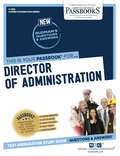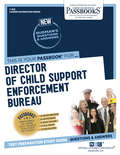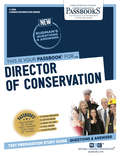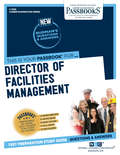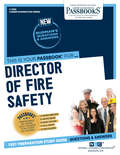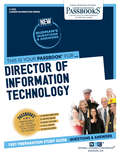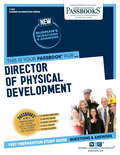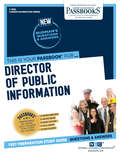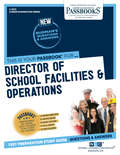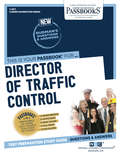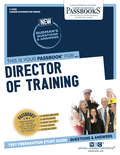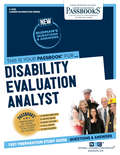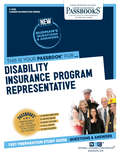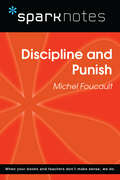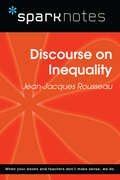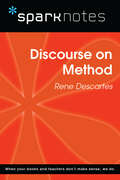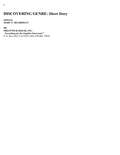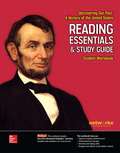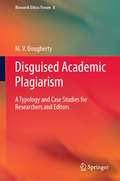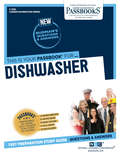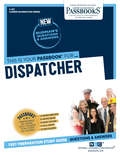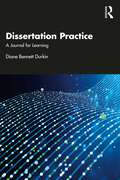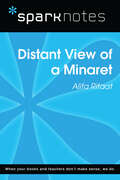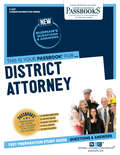- Table View
- List View
Director of Administration: Passbooks Study Guide (Career Examination Series)
by National Learning CorporationThe Director of Administration Passbook® prepares you for your test by allowing you to take practice exams in the subjects you need to study. It provides hundreds of questions and answers in the areas that will likely be covered on your upcoming exam, including but not limited to: administrative supervision; administration; administrative analysis; organizing data into tables and records; preparing written material; and other related areas.
Director of Child Support Enforcement Bureau: Passbooks Study Guide (Career Examination Series)
by National Learning CorporationThe Director of Child Support Enforcement Bureau Passbook® prepares you for your test by allowing you to take practice exams in the subjects you need to study. It provides hundreds of questions and answers in the areas that will likely be covered on your upcoming exam, including but not limited to: investigative techniques; investigating and evaluating financial resources and assets; understanding and interpreting tabular material; administration; administrative supervision; and other related areas.
Director of Conservation: Passbooks Study Guide (Career Examination Series)
by National Learning CorporationThe Director of Conservation Passbook® prepares you for your test by allowing you to take practice exams in the subjects you need to study. It provides hundreds of questions and answers in the areas that will likely be covered on your upcoming exam, including but not limited to: marine biology; marine ecology; marine resources management; perperation of written material; administrative supervision; and other related areas.
Director of Facilities Management: Passbooks Study Guide (Career Examination Series)
by National Learning CorporationThe Director of Facilities Management Passbook® prepares you for your test by allowing you to take practice exams in the subjects you need to study. It provides hundreds of questions and answers in the areas that will likely be covered on your upcoming exam.
Director of Fire Safety: Passbooks Study Guide (Career Examination Series)
by National Learning CorporationThe Director of Fire Safety Passbook® prepares you for your test by allowing you to take practice exams in the subjects you need to study. It provides hundreds of questions and answers in the areas that will likely be covered on your upcoming exam.
Director of Information Technology: Passbooks Study Guide (Career Examination Series)
by National Learning CorporationThe Director of Information Technology Passbook® prepares you for your test by allowing you to take practice exams in the subjects you need to study. It provides hundreds of questions and answers in the areas that will likely be covered on your upcoming exam.
Director of Physical Development: Passbooks Study Guide (Career Examination Series)
by National Learning CorporationThe Director of Physical Development Passbook® prepares you for your test by allowing you to take practice exams in the subjects you need to study. It provides hundreds of questions and answers in the areas that will likely be covered on your upcoming exam, including but not limited to: understanding, interpreting and applying housing and community development laws, rules and regulations; preparing written material; supervision; and other related areas.
Director of Public Information: Passbooks Study Guide (Career Examination Series)
by National Learning CorporationThe Director of Public Information Passbook® prepares you for your test by allowing you to take practice exams in the subjects you need to study. It provides hundreds of questions and answers in the areas that will likely be covered on your upcoming exam, including but not limited to: administrative public relations; directing a public information program; grammar, usage, punctuation and editing; format, layout and design of public information materials; preparing public information materals; preparing written material; and other related areas.
Director of School Facilities & Operations: Passbooks Study Guide (Career Examination Series)
by National Learning CorporationThe Director of School Facilities and Operations Passbook® prepares you for your test by allowing you to take practice exams in the subjects you need to study. It provides hundreds of questions and answers in the areas that will likely be covered on your upcoming exam, including but not limited to: administrative supervision; building and grounds maintenance; plans, specifications and estimates; maintenance of physical plants and mechanical and electrical equipment; preparing written material; and more.
Director of Traffic Control: Passbooks Study Guide (Career Examination Series)
by National Learning CorporationThe Director of Traffic Control Passbook® prepares you for your test by allowing you to take practice exams in the subjects you need to study. It provides hundreds of questions and answers in the areas that will likely be covered on your upcoming exam, including but not limited to: traffic control devices and regulations; design, construction, operation and maintenance of parking structures and facilities; administrative supervision; collection, evaluation and presentation of data; and more.
Director of Training: Passbooks Study Guide (Career Examination Series)
by National Learning CorporationThe Director of Training Passbook® prepares you for your test by allowing you to take practice exams in the subjects you need to study. It provides hundreds of questions and answers in the areas that will likely be covered on your upcoming exam, including but not limited to; Tuition- reimbursement plans; Human relations laboratory training; Executive seminars; Staff development training methods; and more.
Disability Evaluation Analyst: Passbooks Study Guide (Career Examination Series)
by National Learning CorporationThe Disability Evaluation Analyst Passbook® prepares you for your test by allowing you to take practice exams in the subjects you need to study. It provides hundreds of questions and answers in the areas that will likely be covered on your upcoming exam, including but not limited to: interpret and accurately apply written laws, rules, regulations, policies and procedures; gather and analyze data; report writing; understanding and interpreting written material; evaluating conclusions in light of known facts; interviewing; and other related areas.
Disability Insurance Program Representative: Passbooks Study Guide (Career Examination Series)
by National Learning CorporationThe Disability Insurance Program Representative Passbook® prepares you for your test by allowing you to take practice exams in the subjects you need to study. It provides hundreds of questions and answers in the areas that will likely be covered on your upcoming exam, including but not limited to: interpret and accurately apply written laws, rules, regulations, policies and procedures; gather and analyze data; report writing; understanding and interpreting written material; knowledge of medical terms; and other related areas.
Discipline Rules Made Objective
by Muthuswamy BrindaThe questions in this book have been coined in such a way that all rules and decisions have been covered. All possible direct questions have been extracted by our editorial board and incorporated in this book. This will surely help the examination candidates to get a good understanding of the Rules and answer the exam questions. The answers are given at the end of this book. For reference purpose, the corresponding rule, GID and Office Memorandum are also given along with the answer. Readers are encouraged to refer Swamy’s Compilation of CCS (CCA) Rules and Swamy’s Compilation of CCS (Conduct) Rules for a detailed explanation to the answer.
Discipline and Punish (SparkNotes Philosophy Guide)
by SparkNotesDiscipline and Punish (SparkNotes Philosophy Guide) Making the reading experience fun! SparkNotes Philosophy Guides are one-stop guides to the great works of philosophy–masterpieces that stand at the foundations of Western thought. Inside each Philosophy Guide you&’ll find insightful overviews of great philosophical works of the Western world.
Discourse on Inequality (SparkNotes Philosophy Guide)
by SparkNotesDiscourse on Inequality (SparkNotes Philosophy Guide) Making the reading experience fun! SparkNotes Philosophy Guides are one-stop guides to the great works of philosophy–masterpieces that stand at the foundations of Western thought. Inside each Philosophy Guide you&’ll find insightful overviews of great philosophical works of the Western world.
Discourse on Method (SparkNotes Philosophy Guide)
by SparkNotesDiscourse on Method (SparkNotes Philosophy Guide) Making the reading experience fun! SparkNotes Philosophy Guides are one-stop guides to the great works of philosophy–masterpieces that stand at the foundations of Western thought. Inside each Philosophy Guide you&’ll find insightful overviews of great philosophical works of the Western world.
Discovering Genre: Short Story
by Douglas GrudzinaThis text digs deep into fifteen great short stories, from "The Cask of Amontillado" to "The Lottery", making your students really examine the author's choices: tone, point of view, style, setting, characterization, etc. This is a student classroom edition. Tests and Answer Keys are available from the publisher but are sold only to schools and teachers.
Discovering Our Past: Reading Essentials And Study Guide, Student Workbook
by McGraw-Hill EducationWorkbook Reading Essentials and Study Guide (English and Spanish) reinforces critical concepts from the text and helps students improve their reading-for-information skills with this essential resource, written 2-3 grade levels below the Student Edition.
Disguised Academic Plagiarism: A Typology and Case Studies for Researchers and Editors (Research Ethics Forum #8)
by M. V. DoughertyThis volume is the first book-length study of disguised forms of plagiarism that mar the body of published research in humanities disciplines. As a contribution to applied research ethics, this practical guide offers a typology of the principal forms of disguised plagiarism. It provides detailed analyses, in-depth case studies, and useful flow charts to assist researchers, editors, and publishers in protecting the integrity of the body of published research literature. Disguised plagiarism is more subtle than copy-and-paste plagiarism; all its varieties involve some additional concealment that creates further distance between the plagiarizing text and its source. These disguised forms are the most difficult forms of plagiarism to detect. Readers of the volume will become acquainted with the subtler forms of plagiarism that corrupt the production and dissemination of knowledge in humanities fields. The book is valuable not only to those interested in research ethics, but also to those in humanities fields including philosophy, theology, and history.
Dishwasher: Passbooks Study Guide (Career Examination Series)
by National Learning CorporationThe Dishwasher Passbook® prepares you for your test by allowing you to take practice exams in the subjects you need to study. It provides hundreds of questions and answers in the areas that will likely be covered on your upcoming exam, including but not limited to: dishwashing and hygiene; verbal abilities; understanding and interpreting written material; arithmetic; and other related areas.
Dispatcher: Passbooks Study Guide (Career Examination Series #C-294)
by National Learning CorporationThe Dispatcher Passbook® prepares you for your test by allowing you to take practice exams in the subjects you need to study. It provides hundreds of questions and answers in the areas that will likely be covered on your upcoming exam, including but not limited to: coding/decoding information; following directions and maps; procedures related to emergency calls and situations; name and number checking; understanding and interpreting written material; and more.
Dissertation Practice: A Journal for Learning
by Diane Bennett DurkinDissertation Practice: A Journal for Learning is an interactive resource that promotes journaling to engender key dissertation practices, through activities and exercises. It is rooted in the view that students can use journaling to promote thought, and that the privacy of journal entries ensures comfort and familiarity. This personal context, along with the book’s open prompts, allows students to engage in extended and alternative thinking.The practices suggested here offer opportunities to imagine, create, explain, rethink, analyze, and argue for a study. The book includes blank space for students to enter short pieces of writing – such as reflections, examples, range of topics, and sample annotations – to generate and review thought, and includes features such as self-assessment questions, working with your chair boxes, revision practices, and examples of students’ work. As a journal of thinking, it allows students to record their thoughts as they materialize into words, provides a safe place for practice and trial, and helps them locate in one place key pieces of writing foundational to their dissertation.This is an essential resource for students in PhD and EdD programs in the social sciences and education who are using qualitative, quantitative, and mixed methods.
Distant View of a Minaret (SparkNotes Literature Guide Series)
by SparkNotesDistant View of a Minaret (SparkNotes Literature Guide) by Alifa Rifaat Making the reading experience fun! Created by Harvard students for students everywhere, SparkNotes is a new breed of study guide: smarter, better, faster.Geared to what today's students need to know, SparkNotes provides:chapter-by-chapter analysis explanations of key themes, motifs, and symbols a review quiz and essay topics Lively and accessible, these guides are perfect for late-night studying and writing papers.
District Attorney: Passbooks Study Guide (Career Examination Series)
by National Learning CorporationThe District Attorney Passbook® prepares you for your test by allowing you to take practice exams in the subjects you need to study. It provides hundreds of questions and answers in the areas that will likely be covered on your upcoming exam, including but not limited to: legal terminology, documents and forms; criminal law and procedures; reading comprehension; preparing written material, including grammar and spelling; and more.
